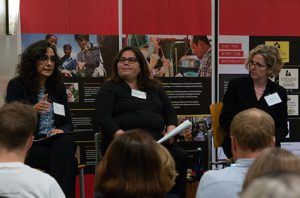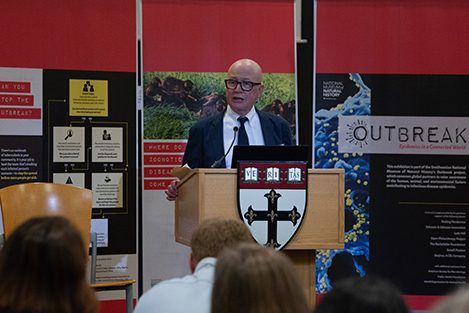October 3, 2018—In past pandemics, infrastructure failures and problematic language in the media have undercut efforts to contain disease, according to Harvard’s Allan Brandt.
Brandt, professor of the history of science and Amalie Moses Kass Professor of the History of Medicine at Harvard University, was keynote speaker at a September 25, 2018 event in Kresge cafeteria that examined the spread and containment of pandemics through a historical lens. Presented by Harvard Global Health Institute (HGHI), the event was part of Outbreak Week, a University-wide look at pandemic preparedness, which coincided with the centennial of the 1918 influenza pandemic that killed at least 50 million people worldwide.
“One hundred years later, tremendous advances have been made, no doubt, in science, in technology, and in health,” said Dean Michele Williams in opening remarks. “It is a striking fact that in spite of all of these many advances, we are globally still underprepared for the next pandemic.”
Brandt traced how responses to cholera epidemics in 19th century New York City evolved from prayer and quarantine to addressing a lack of clean water technology. In the wake of the outbreaks, the city established the New York Metropolitan Board of Health and invested heavily in water infrastructure.
Brandt also said that biased language in media coverage can encourage attitudes of fear and blame toward epidemic victims. For example, during the HIV/AIDS epidemic, news reports referred to women and children who contracted the virus through blood transfusions as “innocent victims,” which inferred that people who contracted HIV/AIDS through sexual intercourse were not.

Both infrastructure failures and problematic language were issues during the Ebola epidemic that broke out in West Africa in 2014, Brandt said. President Obama committed 300,000 troops to the region to fight Ebola, but by the time they were trained and deployed, the epidemic had subsided. Meanwhile, news headlines called the outbreak a “perfect storm.” This phrase implies that epidemics are “unpredictable, idiosyncratic—you can’t really plan in advance, and you can’t really change the outcome,” said Brandt. Such language can undermine prevention efforts, he said.
A panel, moderated by Ingrid Katz, associate faculty director of HGHI and assistant professor of medicine at Brigham and Women’s Hospital, considered the role of infrastructure, government, and culture in disease outbreaks around the globe. Marcia Castro, professor of demography at Harvard Chan School, discussed the reduction of yellow fever in Brazil, efforts to combat Zika, and the need to continue preventive measures after an epidemic ends. Jesse Bump, lecturer on global health policy at Harvard Chan School and executive director of the Takemi Program in International Health, discussed how the social contract between citizens and government is strongly tied to disease prevention and how public health institutions such as the U.S. Centers for Disease Control and Prevention arose from the need to combat specific diseases.
